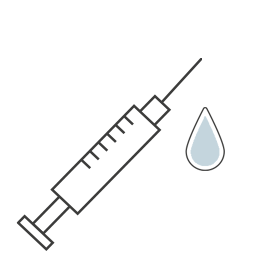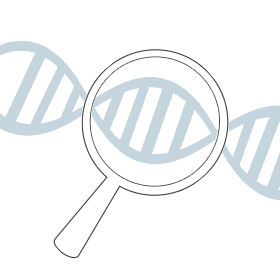
Overview
Genetic factors can be detected in up to 25% of all cases of male infertility and can have a decisive influence on the course of fertility treatment. In about 70% of couples experiencing infertility, a low semen count is often to blame. Factors that have a decisive influence on sperm quality and therefore male infertility are manifold and include lifestyle habits, diet, as well as genetic factors. The FERTIFATE MALE test screens for the two most common genetic causes of male infertility. The first part of the genetic screening entails the preparation of a so-called Karyogram, which enables the detection of chromosomal abnormalities.
About 15% of all men with azoospermia or severe oligozoospermia show chromosomal anomalies, which are among the most frequent genetic changes found in patients suffering from male factor infertility. In addition to chromosomal changes, the loss of specific gene regions located on the Y chromosome can also be responsible for inducing male infertility. These regions are referred to as the AZF regions (azoospermia factor) and are essential for correct spermatogenesis (male germ cell maturation). The second part of this genetic screening involves the analysis of AZF regions on the Y chromosome, where a loss of any part of these regions can be found in up to 10% of all patients with azoospermia.
Advantages
Through the analysis of the most common genetic causes associated with male factor infertility, affected men not only discover the reason behind their reduced sperm quality—but they also have the opportunity to discuss the results of these finding with their doctor, and decide how this information will influence their plans to start a family.
For example: if chromosomal changes are detected during screening, then prenatal diagnostics can be used during fertility treatment to help select genetically stable embryos before embryo implantation. If genetic screening detects a loss of specific AZR regions on the Y chromosome, then—under certain circumstances—it may be possible to obtain sperm from the testes directly through a testicular puncture. The probability of obtaining sperm through testicular puncture is calculated individually for each patient depending on the type and extent of their AZF-regions loss.
All of these methods can significantly increase the chances of a successful pregnancy.
Indications
We recommend the FERTIFATE MALE analysis to all men with severely reduced sperm count, as well as to patients suffering from male factor infertility with no apparent cause.
Workflow
-

1. Blood draw -

2. Chromosomal analysis -

3. Results -

4. Discussion of results
It usually takes three to four weeks after the date you had your blood drawn to receive your results.





























